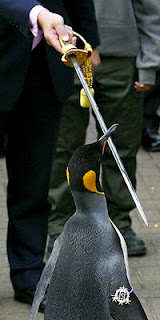This week, I'm on The Unbelievable Truth again, which is one of my favourite shows to do, and indeed to listen to. You can hear it here, via the iPlayer for the next six days or so.
In the show, you give a short lecture on a subject, almost all of which must be lies, but with five 'unbelievable truths' hidden somewhere. Here is what I had to say about dogs, together with some extra nonsense which didn't make the edit. But to find out four of the five unbelievable truths hidden therein, you will have to listen to the show...
My
dog can fly.
Dogs
and humans have been together since the beginning of time. The Ancient Greeks
used spaniels to catch fish and tell the future. Old English sheepdogs were
used in old England to herd pigeons and children. Aristocrats used miniature
poodles as hand-warmers, whilst starving peasants would allow Yorkshire Terriers
to swim in a cauldron of warm water for ten minutes, and then drink the result,
known as 'Dog Soup'. And of course today, dogs work for us as everything from
wine tasters to air traffic controllers.
The
actor John Wayne claimed he had won Lassie the dog in a poker game. However,
Lassie the dog claimed she had won the actor John Wayne in a poker game. It was
a classic stand-off. John Wayne called Lassie the dog a dirty liar. Lassie said
the hell she was a liar, one-eyed jacks were wild, and John Wayne damn well
knew it. John Wayne said all dogs cheated at cards anyway, did Lassie think
he’d never seen that painting? In the
resulting shootout, Lassie lost an ear, and John Wayne was killed. But not
wanting to upset the children, Columbia Studios bought another cowboy that
looked just like John Wayne, and never told anybody. Similarly, we’re already
on our fifth Justin Bieber.
Dog,
spelt backwards, is of course 'good'; a fact that has led many people to
worship them as Gods. The Toltec civilisation believed their Gods watched them
through the eyes of chihuahuas. The Egyptian God Atem had the head of a dog and
the body of a squirrel, and was forever chasing himself around heaven. And of course
St Christopher is often portrayed with the head of a dog, owing to an
unfortunate confusion between 'from Canaan' and 'Canine'
David
will like this - the Siberian Husky is not technically a dog at all. It is in
fact... six cats in a costume. Two on the front legs, two on the back, one in
the head, and one in the middle working the tongue and the tail. You might ask,
how could one cat inside a husky reach both the tongue and the tail? To which I
would reply... Is that really the part of this that's bothering you?
The
inventor Alexander Graham Bell claimed he had taught his dog to talk. However,
it was noticeable he would only claim this whilst using his new invention, the
telephone. 'Oh, by the by’ he would say ‘I’ve taught the dog to talk. Shall I
put him on? "Herro! I'm Ruffles! Rri can talk now! Sausages!" There.
That was him. Aren't I a good inventor?'
As
a boy, King William II rode out to hunt on a mastiff instead of a horse. Henry
III would often wear a basket of Bichon Frises round his neck in a confused attempt to get girls to look at
him. And of course the Queen has six corgis, named Tesco, Shiny George, Little
Sir Woofsalot, Bernard Bresslaw, Argax the Destroyer, and Unnamed Dog.
Only
sixteen dalmations were used in the live action remake of 101 Dalmations. They
were then multiplied with CGI, but only after special dog make-up artists
changed the pattern of their spots. The film did, however, use two Glenn
Closes, as the original got rabies during filming, and the studio just pulled
the old John Wayne trick.
My
dog can't fly. But he can ride a horse.
The fifth unbelievable truth I am going to tell you now, because it's my new favourite truth I have ever tried to smuggle on the show (beating the previous title-holder, which was that Prince Waldemar of Prussia once played a trick on his grandmother, Queen Victoria, by letting a crocodile loose in her study.)
It is that in the Eastern Orthodox Church, St Christopher was often shown in icons as having the head of a dog, because of a mix-up between the Latin for 'from Canaan' and… 'Canine'. Yes, that is actually true. I know, but it is. No, it is. Trust me, it is.
I can tell you still don't believe me.
Fine.
 |
| St Stephen trying to dry St Christopher's paws before he comes into the house. |
 |
| St Christopher performing the miracle of the Untaken Biscuit. |
 |
| 'Shake, St Christopher! Good boy!' |







%2C_1898.png)




























